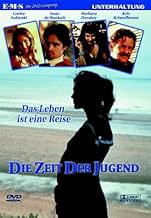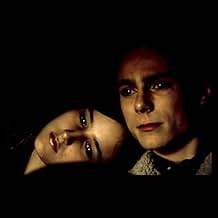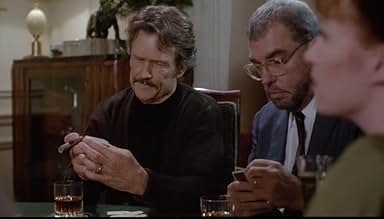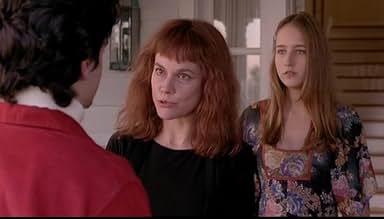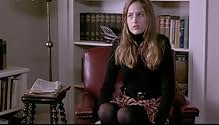Añade un argumento en tu idiomaThis fictionalized story, based on the family life of writer James Jones, is an emotionless slice-of-life story. Jones here is portrayed as Bill Willis, a former war hero and now successful ... Leer todoThis fictionalized story, based on the family life of writer James Jones, is an emotionless slice-of-life story. Jones here is portrayed as Bill Willis, a former war hero and now successful author who obviously drinks too much and is starting to experience health problems.This fictionalized story, based on the family life of writer James Jones, is an emotionless slice-of-life story. Jones here is portrayed as Bill Willis, a former war hero and now successful author who obviously drinks too much and is starting to experience health problems.
- Dirección
- Guión
- Reparto principal
- Premios
- 4 nominaciones en total
- Mamadou
- (as Isaac De Bankole)
- Madame Beauvier
- (as Macha Meril)
- Stephane
- (as Frederic Da)
Reseñas destacadas
Otherwise, the movie is fine in the sense that it is intelligently written. Not only is it based on a novel but it feels as if it WAS a novel rather than a movie. The family is portrayed quite realistically. Even though the film does not seem to try to be artistic, it is lyrical enough to be seen as art.
He and family had been stationed in France for a long while, and the children grew up there. He moved to the USA when they were teenagers, they had difficulty adjusting to the American school and way of life. The family handled the issue of sex in an unconventional manner. Dad figured "they're going to do it anyway, so I'd rather have them in my house, in the bedroom, instead of the back seat of a car somewhere." The boyfriend was quite surprised, to say the least.
Dad died, brother came to accept the fact that his real mother did not really abandon him when she was only 15, the whole family united an memory of dad.
The film is divided into three separate sections: "Billy," which discusses the arrival of an adopted son into the family, "Francis," which revolves around the female protagonist, Channe's, best friend, and "Daddy."
In each of these categories, we are primarily subjected to the experiences of Channe, who is portrayed by the nubile, charismatic Leelee Sobieski. In them, we learn a little about her character, though strangely enough, not as much as we do about her father, whose unconditional positive regard for his daughter does much more than delineate the characteristics of the relationships among the members of the family.
The acting from the entire cast is superb, and from the actors' and actresses' demeanor emanates a very credible atmosphere. Yet the one element that truly grasped my attention was the editing, which with the exception of a couple of segments, added an extremely high element of poignancy to the story. James Ivory was obviously extremely assiduous with the film in this respect, and the final result consists of a strong narrative which appears somewhat terse, but knows exactly what quantity of what the viewer should be fed.
Cynical commentary has argued that this film is nothing short of tripe because it lacks a resolute motive--it consists of no conflict at all. All it is is disjointed scenes which serve no relevance to one another, and fail to tell a coherent story. The former statement in regards to the lack of conflict holds true, but the latter is what might be deemed questionable. Afterall, this is a story about the life of a family--and in a real family, few events from the past bear relevance to those of the present. "A Soldier's Daughter Never Cries" simply seeks to discuss the development of relationships in a family; events of high caliber are discussed thoroughly, while those of less importance portray to be all that they could ever be: memories.
Acting is exceptional in this film. The first segment shows the time right after the brother, Billy, being adopted when he was 7 years old. Channe was also 7 at that time and the child actress who played her (Luisa Conlon) really deserves our praise. In the next two segments Channe (14 and 17 yrs respectively) was brilliantly portrayed by Leelee Sobeiski who is much responsible for the rather reserved nature of the character. Kris Kristofferson does a solid job as the father. His character is an unique one, as evident not only by the words he spoke, but also by Kristofferson's accent and expressions. Among the other actors Jesse Bradford is worth mentioning as Billy is last two segments. The actor who played Francis in "Francis" brings too much dramatic persona in my opinion. Though arguably that's one of the best things about the character. And there's also a nice extended cameo by Virginie Lledoyen as Billy's biological mother.
Now about the characters and screenplay. Though stated from Channe's point of view, her father is the major influential character in this film. It was always his decisions, his outlook towards life that affected his family. The character of Channe is somehow very interesting. Her experiences with womanhood and men are written in an unique manner. And how she develops into a warm, soft-spoken yet determined personality is clearly something that Ivory spent time on. On the other hand Billy is a rather shy and quite unimpressive character with no apparent personal feature that should be rendered as a quality. Now Channe's school friend Francis has all the unusual features - he's an opera singer, loves to dance puppets, has a really corky sense of humor and his mother is an existentialist. His relationship with Channe is one of the film's major assets. All the characters are quite multi-layered, even Billy. The script is also masterfully written. A nice example is the conversation between Channe's father and her High School boyfriend Keith. I don't understand French that well so can't comment about the French dialogues though.
Actually, it is a film that is bound to be enjoyed if seen in a special mood. I'm lucky that I had that mood when it was showing on TV. Also it is a film that grows wonderfully with time, segment after segment. It's a really good coming-of-age story that should be considered as Ivory's one of the best works.
¿Sabías que...?
- CuriosidadesFanny Crawford's debut.
- PifiasThe family is watching Un botín de 500.000 dólares (1974) on TV, which was not even released to theatres until 1974, but we later see a date on a gravestone of 1973 (which means the TV scene was probably set in 1972, since there was an intervening New Year's Eve scene).
- Citas
Billy's Mother: I pray all the time, I pray he will be loved. As is his right.
- Créditos adicionalesThe cast part of the credits is divided into three parts: First "Billy" (1-27), Then "Francis" (28-41), and finally "Daddy" (42-51)
- Banda sonoraAmarra el porto en la dura
Written by Antonio Tejera
Published by Peer International Corporation (BMI)
Performed by Tito Puente
Courtesy of Tico Records and Sonido Inc.
Selecciones populares
- How long is A Soldier's Daughter Never Cries?Con tecnología de Alexa
Detalles
- Fecha de lanzamiento
- Países de origen
- Sitio oficial
- Idiomas
- Títulos en diferentes países
- A Soldier's Daughter Never Cries
- Localizaciones del rodaje
- Empresas productoras
- Ver más compañías en los créditos en IMDbPro
Taquilla
- Recaudación en Estados Unidos y Canadá
- 1.782.005 US$
- Fin de semana de estreno en EE. UU. y Canadá
- 39.517 US$
- 20 sept 1998
- Recaudación en todo el mundo
- 1.782.005 US$
- Duración2 horas 7 minutos
- Mezcla de sonido
- Relación de aspecto
- 1.85 : 1
Contribuir a esta página



